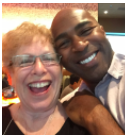WHAT DO YOU BELIEVE IS GOING TO BE THE NEXT BIG IMPORTANT THING TO SHARE?
"Story telling needs to be more amplified. Make sure your story is appropriately represented and distributed. You tell the story in the capacity that would be proud of that tells the real story and not someone else's." - Ken Shelton
This was the last question that Creative Learning Strategist, Barbara Bray of Rethinking Learning, asked Edtech Team keynote speaker Ken Shelton in the podcast A Passion for Storytelling and Equity with Ken Shelton. The entire podcast, in fact, had great passion with the moderator, Barbara, and Ken Shelton. Speaking on topics ranging from Mr. Shelton telling his life story, how he got into education, and eventually his drive behind educational technology, in particularly, how educational technology can impact minority students.
 There were many viewpoints in the podcast. In fact, I was so moved by it, that I created a topic in my Online PD Google Classroom (called Troy Academy Online), asking my fellow administrators, teachers, and outsiders who are apart of the classroom, to review the podcast and begin a discussion.
There were many viewpoints in the podcast. In fact, I was so moved by it, that I created a topic in my Online PD Google Classroom (called Troy Academy Online), asking my fellow administrators, teachers, and outsiders who are apart of the classroom, to review the podcast and begin a discussion.A question that stood out amongst teachers, that I have worked with during my professional learning sessions, is in regard to how school systems use certain jargon to distinguish students. Is there really an equitable divide when schools use the terminology AP, Honors, remedial, and then regular classes? To me, this is intriguing because at times, when educational technology professional learning opportunities are brought into the school, by default, some teachers instantly think of which student group - AP, Honors, regular, etc. - would benefit and actually learn from those skills learned. For instance, when you enter a classroom and suggest a great app to use or a new project to try, I see the look on a teacher's face as they think and say, "which period would this work best" or "this may work for my AP students".
I can get deeper into that topic (maybe for another blog post). However, the last part of the podcast was just as much intriguing. As the conversation is ending, Mr. Shelton speaks on how the impact of technology in the classroom, if use effectively, can give students a voice.
"...In an ideal equitable environment, you have to have technology so each and every student has a platform for their voice. How many stories are going on right now in classrooms that we don't know?...I would like to see telling stories more amplified. If you don't tell your story, someone else will."
This message has carried me from the time I listened to this podcast, and prayerfully, throughout my life. What is your story? How do you represent your story. Can you represent your story, in a way that you are proud of and that no one else can tell?
We all will have different stories. From the administrator who strives to promote equity and equality in their school system, to that teacher who works overtime to give his or her students an engaging and impactful day that makes students not want to leave the class. To the technology directors (shout out to my TC family), who make sure the network and all devices are operational, and no one notices it. Everyone has a story to tell which is great, but make sure it is YOU that is telling the story.
Be sure to tell your story and how it is impacting your students and possibly the world.
A Passion for Storytelling and Equity with Ken Shelton : Rethinking Learning


































